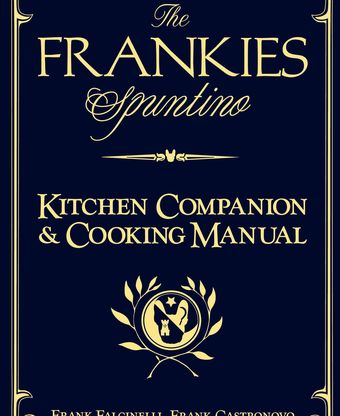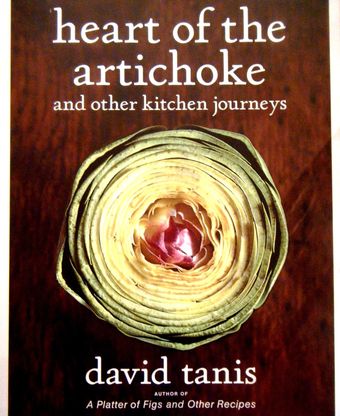I never thought I’d own a cookbook with the word “choke” in the title, yet Heart of the Artichoke (and other kitchen journeys) has proved itself a welcome addition to my kitchen library. Likewise, Frankies easily ranks on my top-ten list, although it looks and feels like a church hymnal -- complete with gold leaf cover -- contains hardly any photos and will not, even with the aid of steam roller, stay open.
Despite its unwieldiness, Frankies reads like a witty field guide to the Italian American kitchen -- honest, informative and worth keeping on your night stand. It begins with “Tomato Sauce,” the only Italian sauce -- “Call it marinara (we do), call it gravy (we don’t), call it whatever your grandma called it," takes you through a few primer chapters -- “Equipment,” “Pantry," “Olive Oil” and “Antipasto" -- and then, gets you cooking. Each of these sections is worth a read, even for the more advanced cook. After perusing “Equipment,” I bought and properly used a hand cranked cavatelli maker. Who knew?
Take the first dish I cooked and tested from Frankies, Tagliatell with Braised Lamb Ragu. From the start their guidance is honest and likable. “It is a two-day dish: the lamb gets braised on day one, and you make the sauce and pasta and put the dish together on day two.” And it continues. “The next thing to pay attention to is to what you’re braising your meat in. The ideal braising liquid is veal stock. If you’re skipping that, use water, not the canned stock crap.” Ouch, no wonder.
That tagliatell was begging to be cooked. I went with the two-day approach and used lamb stock pilfered from a well-known restaurant. Going with the two-day plan was indeed the right call -- something I’d not have done in the past. See, the light cooking comes in on the second day when you serve the dish, which means your kitchen looks clean and presentable at meal time. Good advice. The recipe is spot on, tarragon is definitely the best herb to use, and the meat is insanely tender and flavorful. All the while the guests think it was made effortlessly; such are your skills and such is the state of your kitchen.
After, I played with the Pork Braciola Marinara dish and a few others, including a chocolate tart, because I normally purchase desserts, but Frankies' recipes made me feel like I knew what I was doing in an Italian kitchen. Each had practical tips and straight-to-the-point advice. Even the tart worked.
On the other hand, the cookbook that answers the question “what am I going to cook tonight?” is Tanis's Artichoke. Every recipe is wonderfully simple, easily workable, and as clear as a bell. Adjacent, you'll find a photo of what your dish will look like when you are done -- no tweezers, no airbrushing, no exaggeration. Sure, none of the recipes pushes the culinary envelope in terms of skill, tools or ingredients required, but you will want to make all of them as soon as you open the book. I hovered over every one thinking, “I want to eat that," not “I want to see if I can cook that." In short, this book makes you hungry, not competitive.
Predictably, Tanis injects the “local ingredient” theme into his book's story and dices the content up between seasons. These are nice and quintessentially San Franciscan touches, but after the first read, I ignored all that. I cooked “Bollito Misto Tongue and Brisket with Two Sauces” out of season, because seeing it gave me an intense case of food lust. (Isn’t tongue always in season anyway?) The dish is drop-dead simple and outrageously good. I thought I was one of the only ones who like tongue (it's why I was surprised to find it in this cookbook), but I was wrong. Even my eight year old loved it. In fact, ever since I received a copy of Artichoke -- some seven weeks now -- I’ve been cooking regularly from it, and tonight, I’ll be having the “Fragrant Lamb with Prunes and Almonds” (a recommended variation is rabbit, but with three young girls at home, bunny is a non-starter). In short, Tanis hit the nail on the head with this cookbook; it's simple, delicious, helpful and usable.
In a race between two very good books, Artichoke is the winner. My guess is that you, like me, will cook regularly from it -- you can’t help yourself.



3 Comments